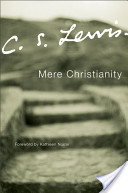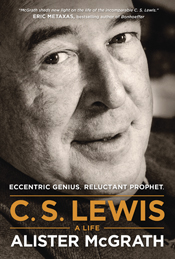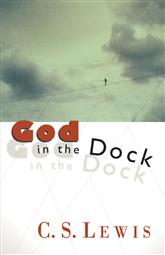
In the world of apologetics, there are few arguments more famous than C.S. Lewis‘ trilemma, which is found in his most popular apologetic work, Mere Christianity. Even classic arguments like Anselm’s famous ontological argument for the “being greater than which nothing can be conceived” and Pascal’s wager, while still part of the discussion of apologetics, have not in recent years been as popular, or reviled, as Lewis’ trilemma. It even spawned a book (Josh McDowell’s More Than a Carpenter) and a song (Dana Key’s “Liar, Lunatic or Lord” from the album, Part of the Mystery). [On a side note, both of these are guilty in my mind of the problems which Alister McGrath points to when you make the trilemma try to function as a proof of divinity. I think McDowell in particular creates misunderstanding regarding the trilemma, which should be critiqued. However, since this piece is about Lewis’ trilemma, and not McDowell’s misapplication, I will only state here that I do not think McDowell is an example of how to understand Lewis.] However, just because an argument is famous, does not mean that is valid as an argument or even that it provides some kind of compelling existential draw. As an example of what I mean, I would look to Anselm’s ontological argument. While I recognize it has flaws as an argument, it continues to fascinate me. I find something existentially compelling to it, and how it has been used (and abused) through history. Conversely, I have never found Pascal’s wager that interesting, though many do. Lewis’ trilemma is one of those arguments which seems to have flaws built into it, but still many people are drawn to it. But do those who critique the argument really land on what Lewis is doing in the trilemma? I do not believe that they do. To demonstrate this, we will consider the argument itself, look at the problems which people have with it and see if these problems really fit with what Lewis wants to do in the trilemma. First, the argument, which is found in chapter 3 of Book II and it is entitled, “The Shocking Alternative.” In this chapter, Lewis is developing his argument for the intervention of God in the person of Jesus Christ. Book II as a whole is Lewis’ development of what Christians believe, and this chapter is about God coming in flesh. And that is the tenor of the argument – what do you think of the human person, Jesus Christ and the claims that the Christian scriptures claim of him, that his suffering on the cross was redemptive for human kind. Lewis closes the chapter this way:
Yet (and this is the strange, significant thing) even His enemies, when they read the Gospels, do not usually get the impression of silliness and conceit. Still less do unprejudiced readers. Christ says that He is ‘humble and meek’ and we believe Him; not noticing that, if He were merely a man, humility and meekness are the very last characteristics we could attribute to some of His sayings. I am trying here to prevent anyone saying the really foolish thing that people often say about Him: ‘I’m ready to accept Jesus as a great moral teacher, but I don’t accept His claim to be God.’ That is the one thing we must not say. A man who was merely a man and said the sort of things Jesus said would not be a great moral teacher. He would either be a lunatic – on a level with the man who says he is a poached egg – or else he would be the Devil of Hell. You must make your choice. Either this man was, and is, the Son of God: or else a madman or something worse. You can shut Him up for a fool, you can spit at Him and kill Him as a demon; or you can fall at His feet and call Him Lord and God. But let us not come with any patronising nonsense about His being a great human teacher. He has not left that open to us. He did not intend to. (Taken from The Complete C.S. Lewis Signature Classics [New York: HarperOne, 2002], 50-51).

Alister McGrath, in his recent biography of Lewis (I recently reviewed this book for the Emerging Scholars Network), says that the trilemma is Lewis’ “defense of the doctrine of the divinity of Christ” (McGrath, C.S. Lewis: A Life [Tyndale, 2013], 226). McGrath says the argument not only fails to account for different options which have come to light through critical scholarship, but the argument is essentially circular. Lewis’ trilemma forces a particular choice by offering a limited set of conclusions which favor the outcome of the choice he wants the reader to make – Jesus must be the Son of God. As an argument for Jesus’ divinity, it seems to assume too much, and those who use it as such ultimately do not (and perhaps cannot) prove, unless it is previously assumed. In McGrath’s mind, the trilemma is a failure as an apologetic endeavor; a misguided attempt which can be invalidated easily. He concludes, “the whole section cries out for expansion, and more careful qualification” (227). As an admirer of Lewis, McGrath is more charitable than someone like Christopher Hitchens, who in his God is not Great, calls Lewis’ reasoning in the trilemma “pathetic.” The essence of the complaint against the argument is that the three choices are not the only ones which are legitimate choices. Specifically, is there a reason – other than our presupposition of his divinity – we cannot add the choice of legend, making it a quadlemma: liar, lunatic, lord or legend? Legend in this case is comparable to how we think of the narratives built around John Henry or St. Nicholas. There is a real historical person behind each of the legends, however, the real historical person has been covered over and embellished by subsequent generations to bolster the standing of the mythical hero in the eyes of the community. St. Nicholas, a real bishop from the fourth century, would probably find it amusing that people think he can know when you are sleeping and when you are awake, since he was a mere mortal man. In much the same way, the legend option says that the Gospel accounts have been embellished by the subsequent generations of the early Christian cult who made claims about Jesus of Nazareth which he never made of himself. In essence then, Jesus was merely a man and the divine claims were added after the life of this simple Nazarene was tragically ended on a Roman cross. Anyone who does not recognize this alternative narrative should see or read The Da Vinci Code.

Lewis actually addressed the ‘legend’ option in another essay which was written before Mere Christianity was published (“What are we to Make of Jesus?” in God in the Dock, ed. by Walter Hooper [Wm. B. Eerdmans, 1970]). In this essay Lewis says, “As a literary historian, I am perfectly convinced that whatever else the Gospels are, they are not legends” (158). There are several reasons which he gives for this opinion: they are not artistic enough, too much detail of Jesus’ life is missing and there are meaningless details included into the stories. However, the chief reason is that as a literary historian, Lewis has lots of experience reading legendary stories, and when he compares these stories to the stories in the Gospels, he concludes “that they are not the same sort of thing” (158). For Lewis, the issue is clear. If the Christian hypothesis (that the Creator God came down as a man to raise up humanity with him through his death on a cross – Phil 2:5-11) is not true, “the alternative is not legend, nor exaggeration, nor apparitions of a ghost. It is either lunacy or lies” (160). This conclusion is exactly what I am suggesting is his plan with the trilemma in Mere Christianity. It is not about proving the divinity of Christ as a logical necessity, as McGrath wants to suggest, but it is a statement about the texts themselves and the person who is written about in the stories. You can’t make the stories be what you want them to be or say what you want them to say. Instead, “you must either accept or reject the story” (160). For Lewis, the trilemma then is not a proof of Jesus’ divinity, but a rejection of a popular option about Jesus, the idea that Jesus is simply a great moral teacher. But Lewis says that is the one option you cannot claim of Jesus. Can Jesus be a great moral teacher if you parse out the divinity which he claimed of himself? Lewis says no, the texts do not allow that option. For Lewis, the moral teachings of Jesus are side-by-side, or perhaps it would be better to say intertwined, with his claims of divinity. Removing one half of the man removes the essence of the man referenced in the texts. There is no half-way with Jesus. The Jesus of the New Testament cannot be a great moral teacher if he is not divine. He can be a crazy man who thinks he is God – but why would you think that he has access to great moral teaching? He can be a moral monster, creating a fabrication to dupe followers into accepting a message he does not even believe – but why would that be moral teaching which is worth following? Could the Jesus of the New Testament be a fabrication? Even if we assume that as a viable option, essentially discounting Lewis’ training as a literary scholar, why would that create a great moral teacher? That would force the options of the trilemma onto the apostles, and you are back in the same situation you were before: they are liars, crazy men, or witnesses of historical reality. There is no way to back the stories of the Gospels into Jesus being a great moral teacher if he is not also the Son of God come in flesh. In my mind, this is what Lewis is saying in the trilemma. You may reject him as a liar, you may reject him as a lunatic, but you cannot accept him as a great moral teacher, unless you also accept that he claimed to be the Son of God come in flesh. This is the Jesus of the texts; this is the Jesus of the stories. Lewis knows at the end of the day, if we strip away what we do not like from the text to get at the person behind the text whom we can tolerate, we are really just projecting ourselves onto the text and the person who is found there. Someone who claims to be God, giving moral teachings as the verbal mouth-piece of God, might be a legend, or a liar, or deluded, or a fiction created by his followers. He is not however, a good moral teacher. The trilemma is an exclusion of the popular mantra of Jesus as a good moral teacher because that mantra is not a viable option from the text itself. Lewis reminds us that texts cannot be formed and molded to be whatever we want them to be – rather they are received by subsequent generations, whether they are the Biblical texts or any other historical text. What we do with them then, is limited by the text itself. We cannot make the text say what we want it to say. The trilemma then is a reminder that certain options are not open to us. Lewis’ focus is not on the three, but on the exclusion of the one which he does not intend to leave as an option on the table. The Jesus of the text is not a merely a good moral teacher. But he might just be what the texts claim him to be: the God-man who forgives sin.
I am a PhD student in theology at Catholic University of America in Washington, DC. I am studying the theology of John Williamson Nevin, who taught in the seminary of the German Reformed Church in America in the mid-nineteenth century. He was also the president of Franklin and Marshall College and a friend to James Buchanan, the 15th president of the United States. I am currently a teaching fellow at CUA, teaching undergraduate theology and Church History classes. My goal is to teach at a college or university after completing my degree program. I am also the current vice-president of the graduate student association at CUA. Before life as a grad student (if that were an acronym it would be BLaaGS) I was a teacher and principal in secondary education at various Christian schools in the Northeast. My family and I currently live in Hagerstown, MD.

Much to do to get to rather the same basic point. Neither CSL nor JMcD sought to ‘prove’ the deity of Christ from the Lord, Liar, Lunatic (LLL) choice alone. McD had a lawyer’s cumulative case as did Clive with the moral argument and the argument from reason, etc. Of course if used as a ‘stand alone’ the LLL, it is circular. On the other hand when faced with Christ’s claims and teaching in the gospels, especially every page of the gospel of John, there you are. What to do with this. Now the three choice is not a prove but a denial of the option of appreciating and only being copacetic as opposed to a glad repentant follower of Jesus as Lord, fully human, and also the 2nd person of the trinity. If memory serves me McD bridged from John 8 at the end ‘before Abraham was, ego eimi, I, I AM. Still circular, but if Jesus hadn’t made the claim then the cumulative case about how we respond to him as such has one less line of evidence. Jesus himself made a cumulative case of sorts for various lines of testimony from the middle to end of John chapter five and some of it includes the future judgment. You drew me in. Probably because I was doing an open bible discussion with international graduate students the other day in John 13-14.
I have just begun to read McGrath’s biography of Lewis; so I do not write from personal “research,” but it is a little odd to think that McGrath has really misinterpreted Lewis’s intent. I have long, long known that the trilemma needs to be a … what? … quadralemma. And the reason is that it’s obvious. Surely Lewis knew this. And surely McGrath knew this. I don’t know why Michael Stell thinks otherwise.
Still it is good to see the argument again set before the watching world.
By the way Peter Kreeft and Ron Tacelli in Handbook of Christian Apologetics (IVP,1994), pp. 154-74, present an excellent elaboration and clarification of this trilemma.